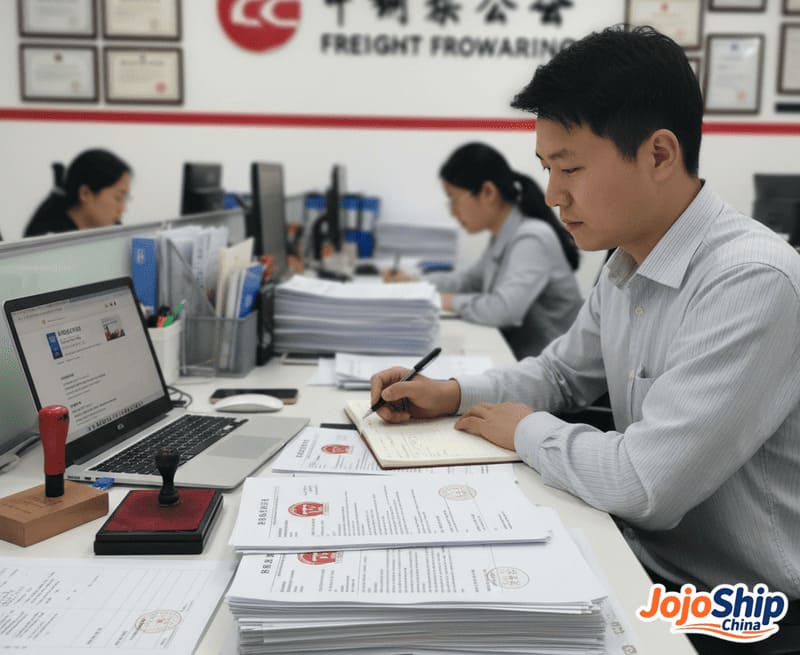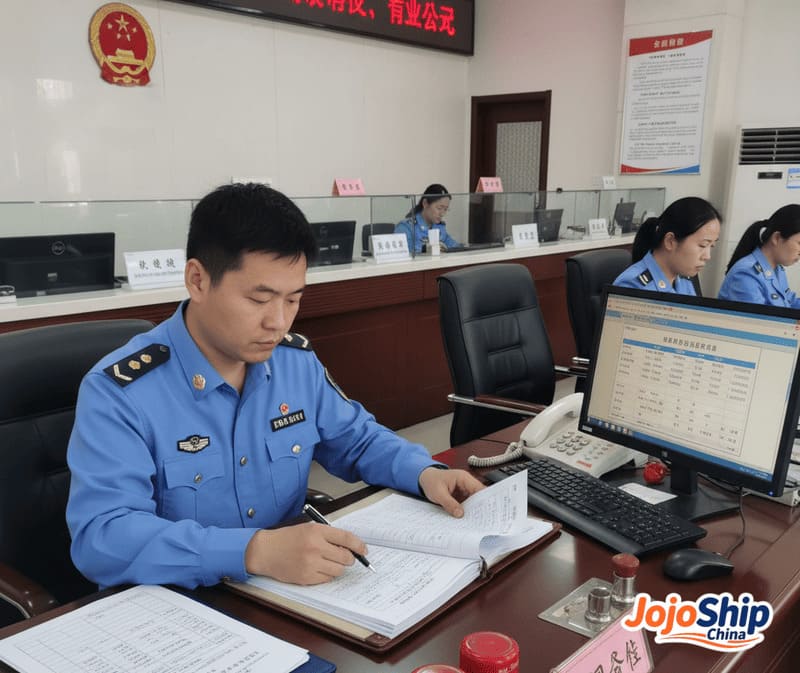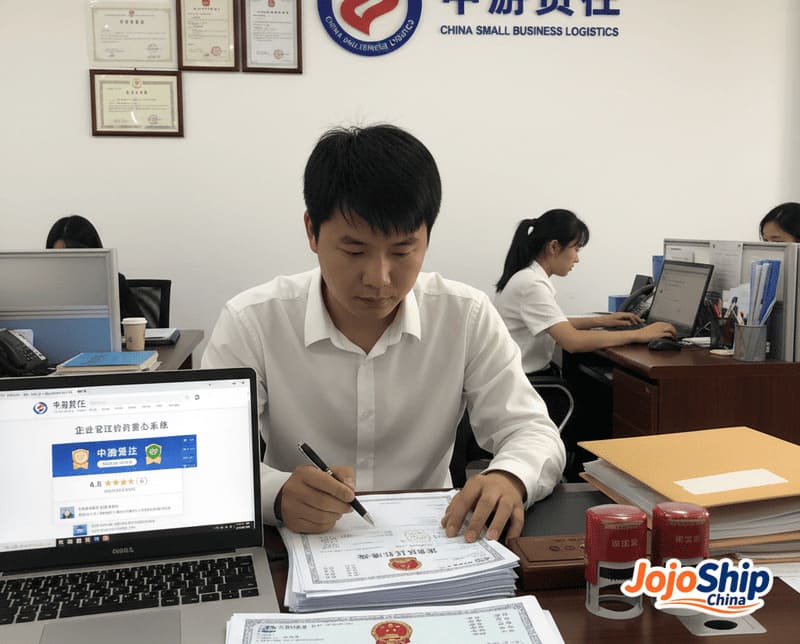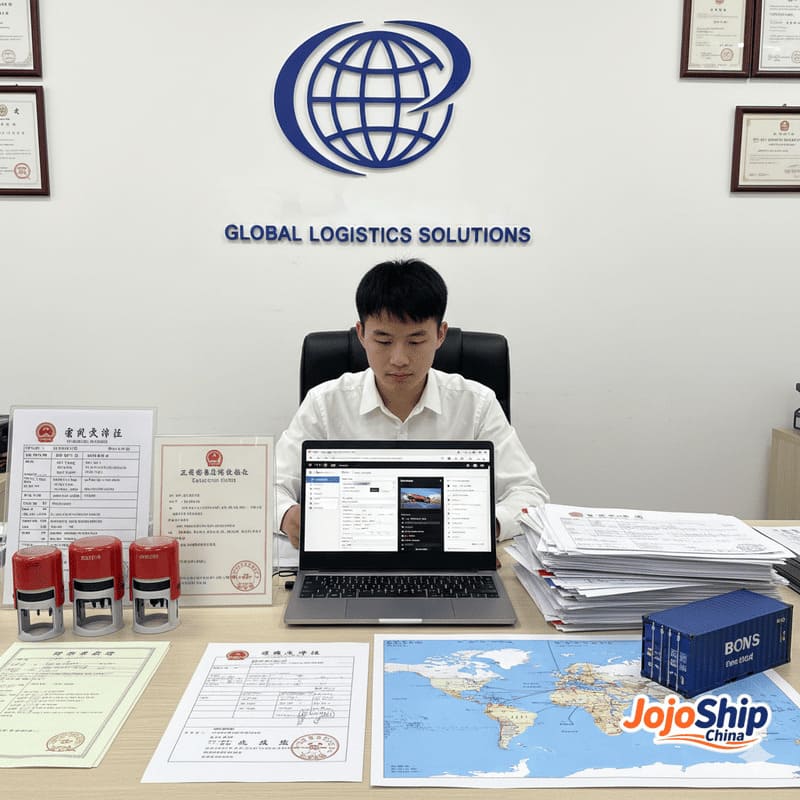Navigating Chinese customs can be a logistical nightmare. With constantly changing regulations, complex documentation requirements, and potential delays, many businesses find their shipments stuck in customs for weeks, incurring unexpected storage fees and missing critical deadlines.
The most reliable freight forwarders offering excellent customs clearance services in China include JojoShip China, DFH Logistics, SINO Shipping, Bansar China, and China Top Forwarder. These companies provide comprehensive customs brokerage, documentation preparation, HS code classification, and compliance management, ensuring smooth export from China and import into destination countries.

Having managed thousands of shipments from China over the past decade, I've experienced firsthand how crucial proper customs clearance is to successful international shipping. The difference between working with a customs-savvy freight forwarder versus a general shipping agent can mean the difference between smooth sailing and costly disasters.
Does a Chinese Freight Forwarder Clear Customs?
Many importers assume all Chinese freight forwarders1 automatically handle customs clearance. This misunderstanding leads to shipments arriving at ports without proper documentation, resulting in delays, additional fees, and sometimes even cargo abandonment.
Yes, most established Chinese freight forwarders do provide customs clearance services for exports from China, but their capabilities vary significantly. The best forwarders offer both export clearance in China and import clearance assistance in destination countries, handling documentation, tariff classification, compliance checks, and duty payment arrangements.

When I first started coordinating shipments from China, I quickly learned that customs clearance isn't just a checkbox—it's a specialized skill that requires deep knowledge of both Chinese export regulations and destination country import rules.
Core Customs Clearance Services Offered by Chinese Freight Forwarders
| Service Component | Basic Forwarders | Advanced Forwarders | なぜ重要なのか |
|---|---|---|---|
| HS Code Classification2 | Limited assistance | Expert classification | Incorrect codes cause delays and penalties |
| Export Documentation | Standard forms only | Comprehensive documentation | Missing documents lead to clearance rejections |
| Pre-Shipment Compliance | Minimal checks | Thorough verification | Non-compliance can result in seized cargo |
| License & Permit Management | Basic guidance | Complete handling | Required for restricted goods |
| Customs Broker Network | Origin only | Origin and destination | Ensures smooth clearance at both ends |
| Duty & Tax Calculation | Basic estimates | Accurate forecasting | Prevents unexpected costs |
| Customs Inspection Support | Limited assistance | Full representation | Reduces examination delays |
| Special Certification | Not typically offered | Available for specialized goods | Critical for regulated products |
In my experience working with multiple Chinese freight forwarders, I've found that companies like JojoShip China and DFH Logistics excel at customs clearance because they maintain in-house customs experts who stay current with China's frequently changing export regulations.
The most comprehensive customs clearance services3 extend beyond just preparing export documents. Top-tier forwarders also conduct pre-compliance checks4 to identify potential red flags before shipments leave the factory. This proactive approach has saved my clients countless hours and thousands of dollars in avoided delays.
I've also learned to value forwarders who maintain strong relationships with customs officials at major Chinese ports like Shanghai, Ningbo, and Shenzhen. These relationships don't circumvent regulations but do facilitate smoother communication when questions arise about documentation or classification.
For businesses shipping regulated products like electronics with lithium batteries, medical supplies, or food items, specialized customs knowledge5 becomes even more critical. Forwarders like SINO Shipping and China Top Forwarder have developed expertise in these challenging categories, making them valuable partners for businesses in these sectors.
How Do I Know If a Chinese Freight Forwarder Is Legit?
The freight forwarding industry in China includes thousands of companies ranging from one-person operations to multinational corporations. This wide spectrum makes it challenging to distinguish legitimate professionals from unscrupulous operators who might disappear with your deposit or mishandle your cargo.
To verify if a Chinese freight forwarder is legitimate, check for proper business licensing including the NVOCC (Non-Vessel Operating Common Carrier) certification from the Ministry of Transport, membership in associations like WCA or FIATA, physical office presence in major Chinese ports, verifiable client references, and transparent pricing structures with formal contracts.

Having helped numerous businesses find reliable logistics partners in China, I've developed a systematic approach to vetting freight forwarders that goes beyond simply checking their website.
Essential Verification Methods for Chinese Freight Forwarders
| Verification Method | What to Check | Red Flags to Watch For |
|---|---|---|
| Business License | Valid Chinese business registration number | Recently established companies, unclear ownership |
| NVOCC License | Registration with Ministry of Transport | Missing or expired licenses |
| Physical Visit/Video Tour | Office and warehouse facilities | Virtual offices only, residential addresses |
| Client References | Similar businesses in your industry | Unwillingness to provide references, generic testimonials |
| Financial Stability | Years in business, company size | Requesting unusually large deposits, no credit terms |
| 保険 | Cargo insurance capabilities | No insurance offerings, unclear liability limits |
| Online Presence | Professional website, industry activity | Limited online footprint, negative reviews |
| Communication Test | Response to detailed inquiries | Vague answers, poor English communication |
One of the most reliable verification techniques I've used is requesting a video call that includes a tour of the forwarder's offices and, if applicable, their warehousing facilities. Legitimate companies are typically proud to showcase their operations, while questionable providers often make excuses to avoid such transparency.
Industry associations provide another layer of verification. Memberships in organizations like the World Cargo Alliance (WCA) or the International Federation of Freight Forwarders Associations (FIATA) indicate a certain level of credibility, as these groups typically require background checks and financial guarantees from their members.
I also recommend requesting documentation of the forwarder's customs brokerage capabilities6 specifically. Legitimate customs brokers in China will have proper licensing and can explain their process for handling various types of shipments. Ask for case studies or examples of how they've handled customs challenges in the past.
Be particularly cautious with forwarders offering rates significantly below market average. In my experience, these unusually low quotes often exclude crucial services like proper customs documentation or result in consolidated shipments that face lengthy delays. Legitimate forwarders provide comprehensive quotes that account for all necessary services.
Finally, start with a small, lower-value shipment before committing to larger orders. This approach allows you to evaluate the forwarder's performance, communication, and customs handling capabilities with minimal risk before entrusting them with more valuable cargo.
What Is the Difference Between Custom Clearance and Freight Forwarding?
Many business owners use the terms "customs clearance" and "freight forwarding" interchangeably, leading to confusion about service expectations and responsibilities. This misconception often results in incomplete service arrangements and gaps in the logistics chain.
Customs clearance specifically involves preparing and processing documentation to facilitate imports/exports through customs barriers, while freight forwarding encompasses the broader organization of shipments from origin to destination. Customs clearance focuses on regulatory compliance and documentation, whereas freight forwarding manages the physical transportation and logistics coordination.

During my years in international logistics, I've seen many clients struggle to understand where freight forwarding ends and customs brokerage begins. Let me clarify the key differences based on practical experience.
Key Differences Between Customs Clearance and Freight Forwarding
| アスペクト | 通関手続き | Freight Forwarding | Integration Points |
|---|---|---|---|
| Primary Focus | Regulatory compliance | Transportation logistics | Documentation alignment |
| Key Personnel | Licensed customs brokers | Logistics coordinators | Communication between teams |
| ドキュメンテーション | Customs declarations, certificates of origin | Bills of lading, commercial invoices | Shared information systems |
| Timing in Process | Critical at border crossings | Throughout entire journey | Preparation before arrival |
| 専門性 | Legal and regulatory expertise | Carrier relationships, route optimization | Coordinated planning |
| Technology Systems | Customs interfaces, compliance databases | Transportation management systems | Integrated visibility platforms |
| Typical Challenges | Classification disputes, missing documents | Routing delays, carrier issues | Information handoffs |
| Client Value | Avoiding penalties, minimizing delays | Efficient transport, cost optimization | Seamless end-to-end experience |
Customs clearance7 is essentially a specialized legal function focused on ensuring your shipment complies with all import and export regulations. The work involves precise documentation, accurate product classification, duty calculation, and sometimes representing your interests during customs inspections.
By contrast, freight forwarding encompasses the logistics of moving goods—booking space with carriers, coordinating pickups and deliveries, consolidating shipments, tracking cargo, and managing the physical flow of goods. While these functions are distinct, they must work in harmony for successful international shipping.
I've found that the most effective logistics arrangements occur when both functions are well-coordinated. For instance, when JojoShip China handles both customs clearance and freight forwarding for my clients' shipments from China to the US, the pre-arrival customs documentation can be prepared precisely while the goods are still in transit, minimizing delays at the destination port.
Another practical difference becomes apparent when problems arise. If your shipment faces a customs hold, you need a specialist in customs regulations and procedures to resolve the issue. Conversely, if your challenge involves transit delays or routing problems, freight forwarding expertise becomes more relevant.
For businesses new to international trade, working with providers that offer both services under one roof, like Bansar China or DFH Logistics, often provides the smoothest experience. These integrated providers8 ensure that customs requirements inform logistics planning from the beginning, rather than being addressed as an afterthought.
The distinction becomes particularly important for specialized shipments. When I helped a client import medical devices from China, the customs clearance component required specific product registrations and safety certifications, while the freight forwarding aspect focused on temperature-controlled transport9 and expedited handling. Both functions were essential but required different expertise.
結論
For reliable customs clearance from China, I recommend JojoShip China, DFH Logistics, and SINO Shipping based on their proven expertise in documentation, compliance, and problem-solving. When selecting a partner, verify their credentials, request references, and start with smaller shipments. The best providers integrate customs clearance seamlessly with freight forwarding, ensuring smooth transitions from factory to final destination.
-
Understanding the roles of freight forwarders can help you choose the right partner for smooth customs clearance. ↩
-
Learn about HS Code Classification to avoid delays and penalties in your shipments. ↩
-
Explore the range of customs clearance services to ensure your shipments comply with regulations. ↩
-
Discover how pre-compliance checks can save you time and money by preventing shipment issues. ↩
-
Explore the importance of specialized customs knowledge to navigate complex regulations effectively. ↩
-
Knowing customs brokerage capabilities is crucial for smooth international shipping and compliance. ↩
-
Understanding customs clearance is crucial for ensuring compliance and avoiding delays in your shipments. ↩
-
Learn about integrated providers to find solutions that combine customs and freight services for efficiency. ↩
-
Explore temperature-controlled transport to ensure the safe handling of sensitive shipments. ↩




